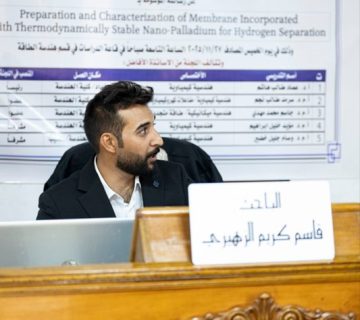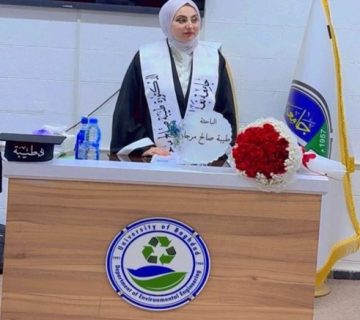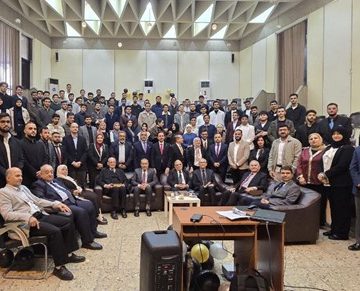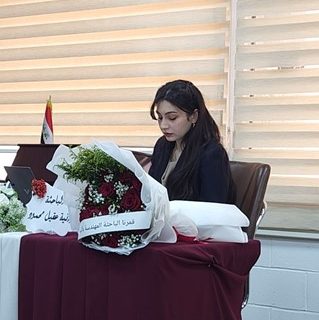The College of Engineering at the University of Baghdad held the public defense of the master’s thesis presented by the student (Saja Hassan Neimah), from the Department of Civil Engineering, entitled:
“MECHANICAL PERFORMANCE OF BACTERIAL SELF-HEALING RIGID PAVEMENT WITH RECYCLED CONCRETE AGGREGATES“, on Wednesday 27/8/2025, in the hall of Professor Dr. Khaled Shaker in the Department of Civil Engineering, under the supervision of (Dr. HAYDER A. AL-BAGHDADI) and (Dr. ASMAA S. AHMAED).
The thesis aimed to achieve main objective:
The main aim of this study is to improve the mechanical and durability performance of rigid pavement concrete through the integration of Alkalibacterium iburiense as a self-healing agent, in combination with recycled concrete aggregates, in order to promote sustainability and reduce maintenance costs.
The study’s main objectives are summarized below:
- Improving the mechanical properties of rigid pavement concrete by enhancing calcium carbonate (CaCO₃) precipitation by microbial metabolic processes. through isolating Alkalibacterium iburiense and integrating it into concrete.
- Evaluate the effectiveness of the self-healing mechanism to repair cracks in concrete by additional Alkalibacterium iburiense.
- To decrease the impact of construction materials waste on the environment by using recycled aggregates in rigid pavement. This can be assumed an impotent application in sustainable engineering.
- To decrease the cost of road maintenance by using self-healing technology instead of traditional approaches.
Accordingly, the discussion came out with a series of recommendations:
- Investigation of Alternative Bacterial Types: Future studies need to investigate the use of different types of bacteria that precipitate calcite. This effort includes genetically modified microbes to determine which types are more efficient and durable in challenging concrete environments. Additionally, use different concentrations of the same bacterial type.
- Application in Various Concrete Types: The incorporation of bacterial technology into various concrete kinds, such as fiber-reinforced concrete or lightweight concrete, could be the subject of future studies.
- Effect on Durability Characteristics: Future research studies should evaluate the impact of bacterial incorporation on other durability characteristics of concrete, including water permeability, chloride ingress, shrinkage, and resistance to freeze-thaw cycles.
- Ever FE program simulation: It is recommended to investigate the effects of thermal stresses using the same parameters utilized in this thesis or by altering factors such as the thickness of the concrete slab, the load on the heavy axle, and the use of quadruple panels.
- Behavior under Structural and Dynamic Loads: Further research to examine the performance of bacterial concrete under seismic loads, dynamic stresses, and fatigue to evaluate its suitability for critical structural elements.
following a scientific discussion by the esteemed members of the discussion committee, listening to the researcher’s defense, and evaluating the thesis, the researcher obtained a Master’s degree with distinction in Civil Engineering / highway and transportation engineering.








